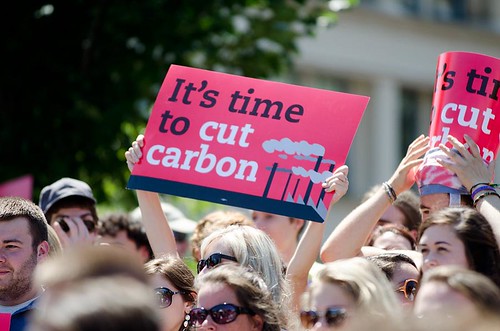Today the Tennessee Valley Authority (TVA) announced it will retire coal boilers at three of its coal plants in Alabama and Kentucky. Retiring these coal boilers means less pollution in the air and water in the southeast U.S. According to the Clean Air Task Force, the Colbert coal plant in Alabama alone contributed to 940 asthma attacks, 83 heart attacks, and 57 deaths per year. These retirements also mean less of the carbon pollution that is pushing our climate to the brink.
This is big. It’s a great move for public health, for clean air and water, and for our climate. It will also help protect families across the southeast from rising energy bills as the cost of coal-generated electricity has continued to increase. I applaud TVA and its new president and CEO, Bill Johnson, for their leadership in setting this great American institution on a new course for the twenty-first century.
This is also big news for the people of the Tennessee Valley who have been working for years for cleaner air and a healthier environment in the Valley, including our friends at the Southern Environmental Law Center, Southern Alliance for Clean Energy, Earthjustice, Environmental Integrity Project, Our Children’s Earth Foundation, and National Parks Conservation Association.
Residents, businesses and industries have spoken loud and clear: they want TVA to provide affordable, reliable and clean power. I grew up in the Smoky Mountains of east Tennessee and went to college at the University of Tennessee in Knoxville, so I know first-hand how much that region has struggled with coal pollution, and how much local residents care about clean air and water.
TVA’s next steps during this retirement process are critical. First, as TVA has done in the past, the utility must consider the workers and communities who have depended on these plants and make sure their livelihoods are protected. TVA’s Board and CEO have a good track record in this regard, and as part of this announcement, they must continue finding ways to provide a responsible transition for affected workers and communities while making significant new investments in the clean energy economy.
Second, we urge TVA to focus on replacing these retiring coal plants with clean and affordable energy technologies in the Valley, helping create jobs and affordable electricity for decades to come. Wind and solar power are cleaner and cheaper than fossil fuels like coal and natural gas, and there are dozens of examples of for-profit and public-power utilities that are making huge investments in clean energy.
Moreover, a commitment from TVA to improve the energy efficiency of homes, businesses, and industries is the quickest way to achieve sustained energy savings and save consumers money in the process.
Finally, we urge TVA not to choose to rely on natural gas. It’s time to leapfrog over natural gas or any other dirty fossil fuel that will continue to exacerbate environmental and public health issues.
The good news is that TVA can deliver on on the promise of clean energy — it’s part of TVA’s history.
In the late 1970s, TVA found itself in a similar situation — sagging demand, declining sales and lower revenues. TVA responded by increasing its commitment to energy efficiency in order to get the company back on track. The result was exactly what you’d expect: customers saved money, pollution decreased and the economy rebounded.
This is TVA’s choice again: get its fiscal house in order by developing and deploying ground-breaking clean energy and energy efficiency programs which delivered real results, rather than continuing down a path of using outdated, inefficient, and dirty energy.
TVA has long been a model for utilities across the U.S., and its legacy of public power is an American treasure. They can continue that legacy by seizing the moment and leading on clean energy.
This is a proud and important day for the people of Tennessee, Kentucky, and the entire Tennessee Valley. Thank you to Bill Johnson and TVA for your leadership in moving away from polluting energy that threatens our health, our climate, and the places we love — including my beloved Smoky Mountains.



